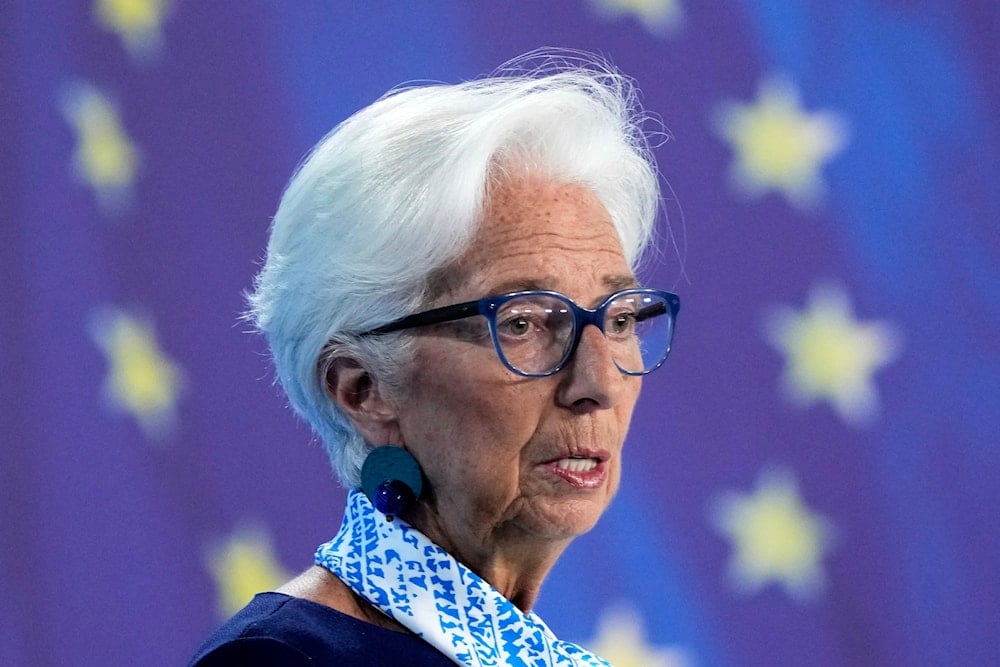'Serious danger' if Trump controls US monetary policy: ECB
ECB chief Christine Lagarde warns Trump’s bid to reshape the Federal Reserve poses serious risks to US and global economic stability.
-

President of the European Central Bank Christine Lagarde briefs the media during a press conference at the bank's headquarters in Frankfurt, Germany, on July 24, 2025. (AP Photo/Michael Probst)
European Central Bank chief Christine Lagarde warned on Monday that the global economy could face serious risks if US President Donald Trump succeeds in reshaping the Federal Reserve.
Speaking to France’s Radio Classique, Lagarde said it would be "very difficult" for Trump "to completely swing the majority" of the Fed’s policymaking body in his favor. But she cautioned that, if he managed to do so, "it would be a very serious danger for the US economy and for the world economy."
Trump is seeking to remove Federal Reserve governor Lisa Cook, a move critics argue is aimed at filling the central bank with allies willing to push for lower interest rates. His push underscores broader concerns over Trump's Federal Reserve appointments and their potential impact on monetary independence.
Lagarde stressed that central bank policies play a critical role in maintaining price stability and securing "optimal" employment. Allowing political interference in this process, she warned, would create severe US monetary policy risks with ripple effects worldwide.
"If it depended on the diktats of one person or another … the balance of the US economy, and consequently the effects it would have on the entire world, would be very worrying," she said.
Lisa Cook, appointed in 2022, has become a target of Trump’s efforts to alter the Fed’s direction. Her potential removal highlights the broader stakes in the debate over Fed independence and raises concerns among economists about mounting global economic danger if the institution’s autonomy is eroded.
Fed independence and legal precedent at stake
The action marks a dramatic escalation from Trump’s earlier pressure campaigns on the Federal Reserve, turning speculation about central bank interference into political reality. While the Federal Reserve Act allows a president to remove a governor "for cause," legal experts note that no Fed governor has ever been fired, and the standards for such an action remain untested in court.
The "cause" cited by Trump appears to stem from allegations raised by Federal Housing Finance Agency head Bill Pulte, who last week referred Cook to the Justice Department for possible criminal prosecution. Pulte claimed Cook falsified mortgage documents and property records to secure favorable loan terms, potentially committing fraud years before she joined the Fed.
Cook has denied wrongdoing, stating that she refuses "to be bullied" over unsubstantiated claims and would continue gathering accurate information to respond to any legitimate concerns.
News of Trump’s move sent ripples through financial markets. Treasury yields rose, gold prices spiked, and the dollar weakened. US stock futures also fell, reflecting investor anxiety over political interference in monetary policy and uncertainty at the central bank.
Analysts warn that undermining the Fed’s credibility could damage its ability to manage inflation, maintain financial stability, and assure markets of its independence. Cook’s term was not set to expire until 2038. She is the first Black woman to serve on the Federal Reserve’s Board of Governors, appointed by former President Joe Biden.
If Trump succeeds in removing her, it would mark the second Fed vacancy in under a month after Adriana Kugler, a member of the Federal Reserve's Board of Governors, resigned earlier in July. The White House has since nominated Council of Economic Advisors Chair Stephen Miran as an interim replacement until January.

 4 Min Read
4 Min Read










